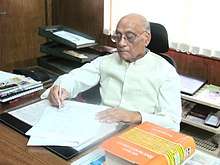Devi Prasad Bagrodia
Devi Prasad Bagrodia (Assamese: দেবী প্ৰসাদ বাগড়োদিয়া), is a noted writer, social worker[1] and tea planter[2] based in Dibrugarh in Assam, India.
Devi Prasad Bagrodia দেবী প্ৰসাদ বাগড়োদিয়া | |
|---|---|
 | |
| Born | 8 November 1939 |
| Occupation | Writer, Tea Planter |
| Language | Assamese, Hindi, English |
| Nationality | [Indian] |
| Alma mater | DHSK College, Dibrugarh |
Biography
Early life
Devi Prasad Bagrodia was born to Shew Bhagovan Bagrodia of Bhekulajuan village of Tengakhat in Dibrugarh district in Assam on 8 November 1939. He was groomed in a total Assamese rural set-up in his village.
Education
Devi Prasad Bagrodia finished matriculation from Tengakhat HE School in Assamese medium. He studied ISc and then studied up to BA at DHS Kanoi College at Dibrugarh.[3]
Career
Published works
Devi Prasad Bagrodia is author of admirable number of books; mostly translation of famous work of Assamese authors. He translated the complete work of Jyoti Prasad Agarwala into Hindi in the form of two books - Jyoti Sudha in 1991 and Jyoti Prabha in 1995. The latter was released by Dr Shankar Dayal Sharma, the Vice President of India. All these work showcasing the Assamese literature and culture have been received well by the scholars at the national level. Recently he has completed translation of Borgeets composed by Mahapurush Sankardev and Madhavdev, beside having translated Gunamala, a transcreation of Bhagavata Purana in Assamese language by Mahapurush Sankardev into Hindi. Bagrodia’s literary work include the Hindi translation of Dr Nagen Saikia’s Mit-Bhash, Chah Gasar Kalam, Sukhor Prithivi, Mirabai, Agastha Yatra etc.[4]
He also published a book titled 'Tha Agarwala Family of Tezpur' written by Bibekananda Agarwala.[5] His other publications include 'You and Me on a Journey to Light' by Candraprasāda Śaikīẏā Ananda Bormudoi[6]
Awards
Bagrodia is a recipient of the Central Hindi Directorate’s award of ‘Translator of remarkable standard’ in 1999 under the Union Ministry of Human Resource Development (India), ‘Fulchand Khandelwar Samhati Award’ in 2002 and ‘Meera Samman’ by the Meera Smruti Sansthan of Chittorgarh, Rajasthan in 2011 and a few others.[7]
Gallery
 Devi Prasad Bagrodia
Devi Prasad Bagrodia Devi Prasad Bagrodia (1st from Right) and dignitaries during release of his book 'Jyoti Prabha'
Devi Prasad Bagrodia (1st from Right) and dignitaries during release of his book 'Jyoti Prabha'_Dr_Shankar_Dayal_Sharma.jpg) Devi Prasad Bagrodia (2nd from Right) with former President of India Dr. Shankar Dayal Sharma during release of his book 'Jyoti Prabha'
Devi Prasad Bagrodia (2nd from Right) with former President of India Dr. Shankar Dayal Sharma during release of his book 'Jyoti Prabha' Jyoti Sudha
Jyoti Sudha Jyoti Prabha
Jyoti Prabha Gunamala in Hindi
Gunamala in Hindi Asom Sahitya Sabha: Ek Parichay
Asom Sahitya Sabha: Ek Parichay Chah Gasar Kalam
Chah Gasar Kalam.jpg) Meera Bai (in Assamese)
Meera Bai (in Assamese) Mita Bhash
Mita Bhash Mrityu Bijoyini Kanaklata
Mrityu Bijoyini Kanaklata Sukhor Prithibi
Sukhor Prithibi Anup Jalota releasing Devi Prasad Bagrodia's Hindi translation of Borgeets
Anup Jalota releasing Devi Prasad Bagrodia's Hindi translation of Borgeets Nam Ghosa, Hindi translation of original work in Assamese by Mohapurush Madhavdev
Nam Ghosa, Hindi translation of original work in Assamese by Mohapurush Madhavdev Jyotiprasad Agarwala Ancestors and Tamulbari
Jyotiprasad Agarwala Ancestors and Tamulbari
References
- "Award for Ramen Barua, Tilmizur Rahman". Assam Tribune. 2 December 2011. Retrieved 19 July 2018.
- http://www.sentinelassam.com/state1/story.php?sec=2&subsec=2&id=138881&dtP=2012-12-15&ppr=1
- http://www.assamtribune.com/scripts/detailsnew.asp?id=may2114/state05 Archived 2014-05-21 at the Wayback Machine
- http://www.assamtribune.com/scripts/detailsnew.asp?id=may2114/state05 Archived 2014-05-21 at the Wayback Machine
- Agarwala, Bibekananda (1998). "The Agarwala family of Tezpur: A vignette of the early generations".
- Śaikīẏā, Candraprasāda (2003). "You and Me on a Journey to Light".
- http://www.assamtribune.com/scripts/detailsnew.asp?id=may2114/state05 Archived 2014-05-21 at the Wayback Machine